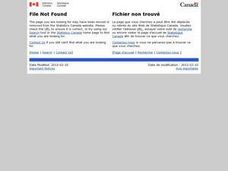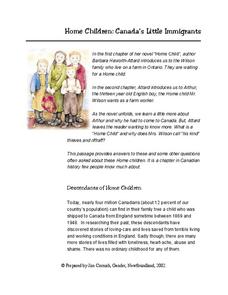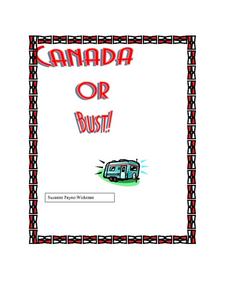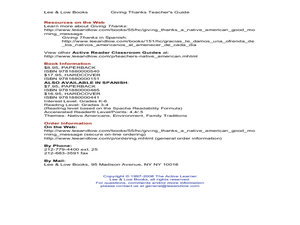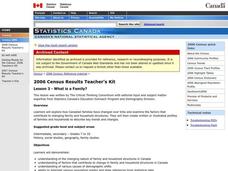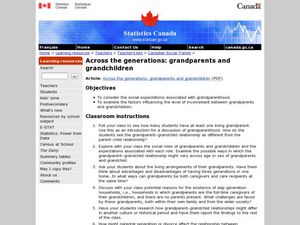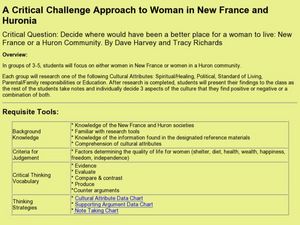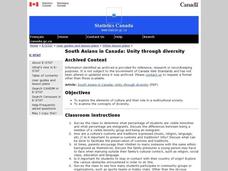Curated OER
Where Were Your Ancestors in 1871?
Here is a nicely designed lesson on ancestry and family history. In it, learners read an article entitled, "Where Were Your Ancestors in 1871?" Then, they make up a series of questions to profile their family and their community 100...
Curated OER
Our Diverse Heritage Family Tree
Students discuss family trees and create their own family trees. They research their cultural backgrounds and make oral presentations to the rest of the class during a multicultural lunch.
Curated OER
Settlers: Creating Family Trees & Historical Plays
Students discuss who the founding members of their community were. In this community family tree lesson, students learn how to read a family tree and discuss information about the founding families of their community.
Curated OER
Home Child History
In this Language Arts worksheet, students read about Canadian history related to the novel Home Child. Students read about the story of Canada's Home children, which began in the mid-1800's.
Curated OER
Canada Or Bust
Seventh graders answer the following problem based lesson with the essential question, "Which city or town in Canada would adequately meet my family's needs for relocation?" They present their city and provide rationale for its...
Curated OER
Settlers: Creating Family Trees & Historical Plays
Students conduct research about the founding families of their communities. They compile historical contexts for the era and develop a family tree and historical skit with their findings.
Curated OER
Lee & Low Books: Giving Thanks Teacher's Guide
Fourth graders participate in reading comprehension activities associated from a teacher's guide. In this reading comprehension lesson, 4th graders read Giving Thanks: A Native American Good Morning Message by Chief Jake Swamp and...
National Museum of the American Indian
The Kwakwaka'Wakw: A Study of a North Pacific Coast People and the Potlatch
Discover the cultural practices and unique value systems of a group of native peoples from Canada called the Kwakwaka'wakw. Your young historians will discuss how conceptions of wealth can vary and how these native people utilized...
Curated OER
What is a Family?
Students explore how Canadian families have evolved over time. In this census results lesson, students examine the factors that contribute to changing family and household structures. Students also create written and illustrated profiles...
Curated OER
Legends as Oral History
Sixth graders read First Nations legends to find information about the First Nations. In this legends as oral history lesson, 6th graders interview and write oral histories from family members.
Curated OER
A Journey Through Time!
Young scholars discover more about conducting genealogical research on the challenges that their ancestors and others experienced during their immigration to Canada and their migration within Canada. They engage in a variety of creative...
Curated OER
Metis- Grade 11
Eleventh graders consider the impact of immigration on native peoples. In this Canadian history lesson, 11th graders watch "Places Not Our Own," and then participate in a classroom simulation that requires them to consider land...
Curated OER
Across the Generations: Grandparents and Grandchildren
Students examine the relationships between grandparents and their grandchildren. In this sociology lesson plan, students analyze and discuss grandparent-grandchild relationships in contemporary times in in recent history.
Curated OER
A Critical Challenge Approach to Woman in New France and Huronia
Students works in groups to study the lives of women in New France and Huron communities. For this French and Indian history lesson, student groups research cultural attributes that existed for women in New France and Huron communities....
EduGAINs
Migration—Push and Pull Factors
What causes people to move from one place, one city, or one country to another? Using the provided migration questionnaire, learners interview family members about the factors that cause them to be pushed from an area or pulled to an area.
Curated OER
The Holocaust: An Introduction for Children (To Be Used with Number the Stars)
In this literature and history worksheet, students prepare to read the novel by Lois Lowry Number the Stars. Students read the history behind the Nazi occupation of Denmark and the arrest of the Jews there. This is a 10 page historical...
Curated OER
Canada's Immigration Policy: Mock Immigration Hearing
Students explore the Canadian immigration process, and assuming the roles of immigrants from varied backgrounds, and take part in mock immigration hearings.
Curated OER
Culture in Atlantic Canada
Ninth graders discuss the aspects of culture and what makes them unique. In small groups, 9th graders use digital cameras to take photos. Groups use their pictures to create a PowerPoint presentation storyboard of their culture.
Curated OER
Nous Nous Souvenons: French-Canadians
Students research the French-Canadian influence in northern New York. They interview families of French-Canadian descent, research immigration history, visit a French restaurant, write narratives about their experiences interviewing...
Curated OER
Families
Students examine Canadian census data from 1981 and 2001 to investigate how the family structure has changed. They investigate important aspects of family life.
Curated OER
The Historic Record, Current Responsibility & Recognition of the Governor General
Students research the history of the Governors General in Canada. They examine the current Governor General of Canada and create a presentation of their research.
Curated OER
Clash of the Canadian Titans
Students research how individual Canadians have contributed to Canada and do a presentation.
Curated OER
The State of Mormonism
Students investigate the history of Mormonism and how this religion has shaped Utah's identity. They explore various websites, answer discussion questions, take a virtual tour of the Mormon Trail, and read newspaper articles about...
Curated OER
South Asians in Canada: Unity through diversity
Ninth graders explore the elements of culture and their role in a multicultural society. In this World History lesson, 9th graders examine the concepts of diversity.


